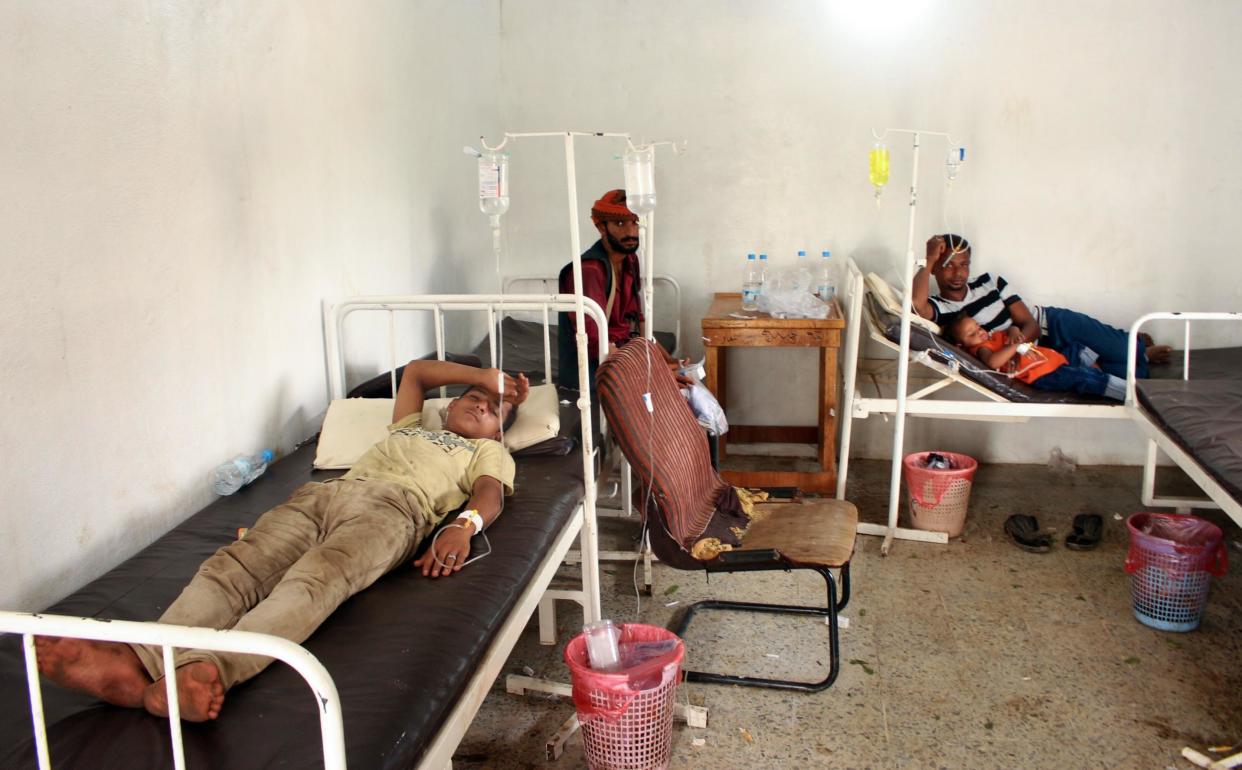15 million in Yemen at risk of deadly diseases as fuel crisis sees water supplies cut

Fifteen million people in Yemen are at risk of deadly diseases such as cholera after their water supplies have been severely cut, Oxfam has warned.
A fuel crisis has seen prices soar, meaning piped water systems and water trucking routes have not been able to run at full capacity leading to the severe water shortages.
The lack of clean water will lead to the spread of waterborne diseases such as cholera, the group said.
War-ravaged Yemen has already seen the worst epidemic of cholera in recorded history.
The World Health Organisation said in September it had registered more than 1 million suspected cases and nearly 1,500 associated deaths across 22 of the country’s 23 governorates since the fighting erupted.
Oxfam blamed the lack of fuel on warring parties “using the economy as a weapon of war” as both sides of the conflict, the recognised Yemeni government and the Houthi rebels, have placed restrictions on imports.
“This weaponisation of the Yemeni economy is yet another cruelty inflicted on the people of Yemen who have been forced to endure four years of conflict,” Muhsin Siddiquey, Oxfam’s Yemen country director, said in a statement.
“All sides need to end the restrictions being imposed on importers so that fuel can once again reach the country unimpeded.”
Yemen, one of the world’s most water-scarce countries, has been torn apart by an increasingly complex civil war which erupted in 2015 when the Iran-backed Houthi rebels swept control of the country ousting the recognised president, Abedrabbo Mansour Hadi.
Saudi Arabia and its Gulf allies launched a bombing campaign to reinstate their ally Mr Hadi, but five years on there is little hope of an end to the conflict
The fighting has sparked the world’s largest humanitarian crisis according to the UN, which said that 24 million people – roughly three-quarters of the population – were in need of aid.
The US-based Armed Conflict Location and Event Data Project (Acled) estimates that more than 90,000 civilians and combatants have been killed.
Fuel supplies have been an ongoing problem in Yemen, but escalated dramatically last month following extra restrictions on imports announced by the internationally- recognised government. The Houthi authorities are also placing restrictions on imports.
“As a result, ships carrying fuel have stopped docking, and prices have shot up due to the lack of supply,” the group said.
That has meant in the Yemeni capital Sana’a petrol prices have tripled since August, it added.
The soaring costs have meant that 11 million people relying on water supplied by piped networks and 4 million people who depend on water trucked in by private companies have seen a massive drop in their water supply.
Central water systems have completely shut down in three major cities, Ibb, Dhamar and Al Mahwit, home to around 400,000 people.
Airstrikes and shelling have also worsened the crisis. Eight of the water systems installed by Oxfam been damaged or destroyed in the fighting, cutting off water supplies to more than a quarter of a million people.
Attempts at a ceasefire have reached a deadlock. This is despite the fact that United Arab Emirates – a leading partner in the Saudi-led coalition – announced a drawdown of its presence in Yemen in the summer.
The UN has warned hopes are still “fragile” and reported that September was the deadliest month for civilians in Yemen this year, with reports of 388 killed or injured.
Meanwhile, the fighting has been complicated by a separate conflict within the anti-Houthi fighting coalition.
Southern separatists, trained and armed by the UAE, seized Aden, the country’s de facto capital, from government forces in August.
The Southern Transitional Council, which is leading the fight for southern independence, is still in talks with Mr Hadi’s government to hammer out an agreement.
Read more
Houthi rebels claim to capture thousands of Saudi troops
Saudi airstrike victim’s family takes fight to UK courts
The drone attack in Saudi Arabia highlights its rift with the UAE
Families who fled Yemen’s war in the north now fear death in the south
Britain, US and France may be complicit in Yemen war crimes, UN says
Inside east Yemen: the Gulf’s new proxy war no one is talking about

 Yahoo News
Yahoo News 
